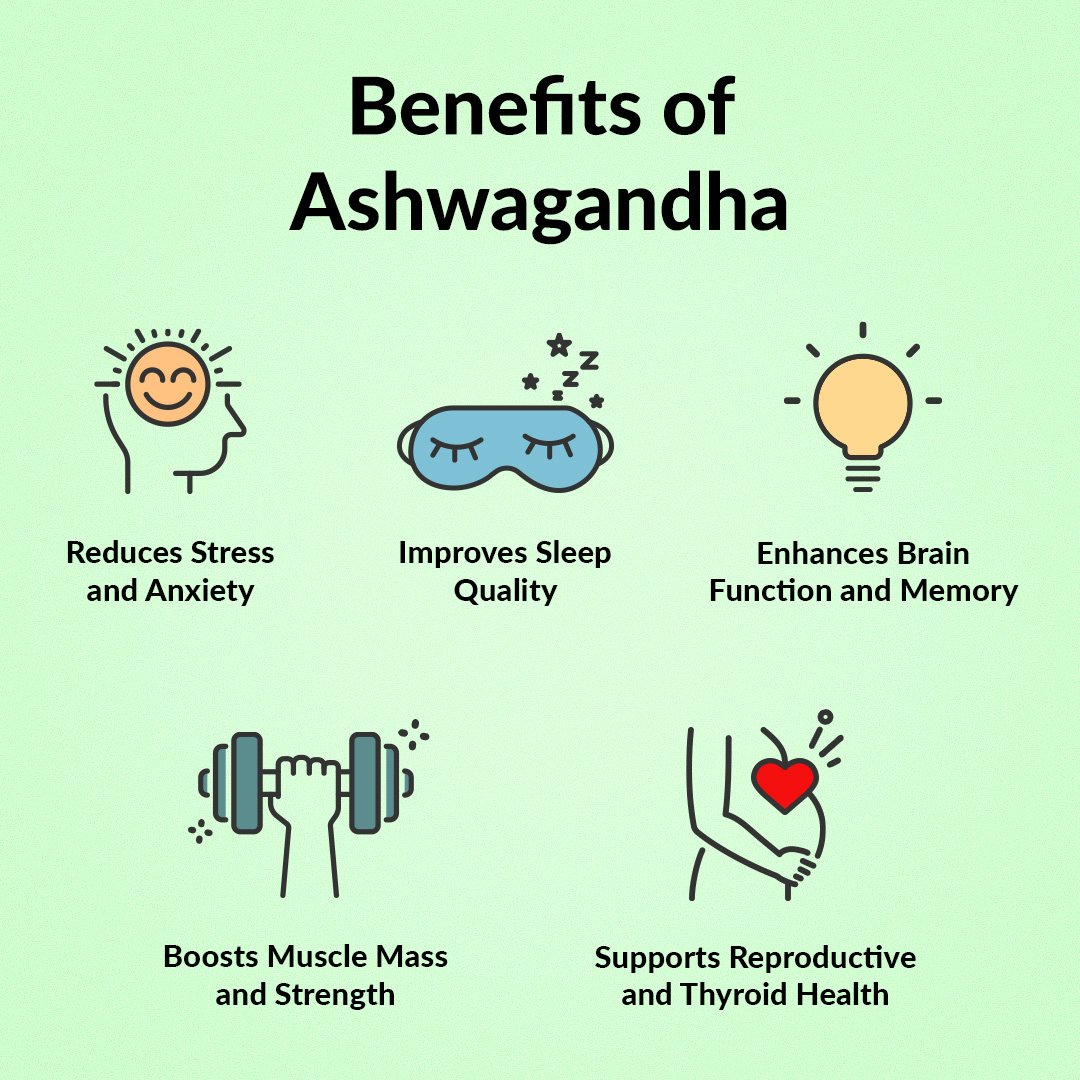Ashwagandha: The Best Supplement For Stress Support
Key Takeaways
- Ashwagandha is an adaptogenic herb from Ayurvedic medicine known for helping the body manage stress.
- The most well-researched benefits include reducing stress and anxiety, improving sleep quality, enhancing brain function, and boosting muscle strength.
- It helps regulate the body's stress hormone, cortisol, and supports the nervous system.
- Look for supplements standardized for withanolides and well-researched extracts like KSM-66® and Sensoril®.
What Is Ashwagandha?
Ashwagandha is a foundational herb in Ayurvedic medicine, a traditional healing system from India that is over 3,000 years old. Often called “Indian ginseng” for its revitalizing effects, its name in Sanskrit translates to “smell of the horse,” referencing both the root’s unique aroma and its traditional use for increasing strength.
For thousands of years, the root of the ashwagandha plant has been revered as a “rasayana,” a substance believed to possess powerful rejuvenating and longevity-promoting properties. The benefits of this root are attributed to its many active compounds, with withanolides being the most important.1
NOTE: While ashwagandha leaves have been used extensively in traditional medicine, primarily for topical uses, internal use is not recommended due to the presence of alkaloids that can cause liver damage and other health issues if consumed in larger amounts. Due to safety issues, use only root preparations or root and leaves extracts that contain less than 0.5% withanolide A.
The Top 5 Benefits Of Ashwagandha

1. Reduces Stress and Anxiety
Ashwagandha is a powerful adaptogen, a class of herbs that improves your body's ability to handle stress, boost energy, and enhance overall well-being. Adaptogens work by helping to regulate hormones and neurotransmitters involved in the stress response, including cortisol.
Historically, adaptogens have been used to:
- Restore vitality and increase energy
- Improve mental and physical performance
- Enhance the body's resilience to the negative effects of stress
High-quality standardized extracts of ashwagandha, like KSM-66® and Sensoril®, have been clinically researched to provide all these adaptogenic effects and more.2-6 For example, in a human double-blind study in subjects who were experiencing significant signs of chronic stress, the group Sensoril® showed significant improvements in feelings of calmness as well as reductions in cortisol levels, pulse rate, blood pressure, and C-reactive protein (a blood marker for inflammation) reduced by 36% compared to only 6% in the placebo group.4
2. Improves Sleep Quality
Ashwagandha helps improve sleep quality through two main pathways: by directly promoting more restful sleep and by indirectly calming the stress and anxiety that often interfere with it. A good night's sleep, in turn, raises energy levels and enhances the ability to deal with stress.
Here's how it works:
- It helps reduce stress and anxiety: Ashwagandha helps to lower the primary stress hormone, cortisol. Clinical studies with standardized extracts like KSM-66 and Sensoril® have demonstrated significant improvements in feelings of calmness and reductions in cortisol levels, creating a better state for sleep.7
- It has been shown to help improve sleep metrics: In one double-blind study, participants with poor sleep quality taking 300 mg of KSM-66® ashwagandha twice daily experienced a 69% improvement in their overall sleep quality score. The study also found that ashwagandha significantly reduced the time it took to fall asleep and decreased nighttime awakenings.3
3. Enhances Brain Function and Memory
Ashwagandha enhances brain function and memory by providing antioxidant effects that protect the brain and by directly improving cognitive performance.8 Clinical studies with high-quality, standardized extracts have demonstrated several key benefits:
- It improves reaction time and task performance. In one double-blind study, healthy male participants taking Sensoril® (250 mg twice daily) showed impressive improvements in performance on six different tests of cognitive function after just 14 days.9
- It boosts memory and executive function, particularly in adults showing some effects of aging. A study with KSM-66® (300 mg twice daily) found significant improvements in both immediate and general memory, as well as in sustained attention and information-processing speed.10
- It supports overall brain function, especially in the elderly. Some of these cognitive benefits may also be a result of ashwagandha's ability to improve sleep quality.11
4. Boosts Muscle Mass and Strength
True to its historical use for increasing strength, clinical studies show that ashwagandha may enhance muscle mass, strength, physical performance, and recovery, especially when combined with resistance training.12-15 Here's how it helps:
- Increases Muscle Strength and Size: In double-blind studies, both men and women taking standardized extracts like KSM-66® saw significantly greater increases in muscle strength on exercises like the bench press and greater muscle size in their arms and chest compared to a placebo group.
- Boosts Endurance and Power: Research shows that ashwagandha can improve power output (e.g., in squats and bench presses) and enhance cardiovascular endurance (VO2max) in athletes.
- Aids Recovery and Supports Hormones: Ashwagandha has been shown to reduce exercise-induced muscle damage. It may also support muscle growth by significantly increasing testosterone levels in men. In women, KSM-66® was shown to significantly improve muscle strength and recovery as well as improve sleep quality.
5. Supports Reproductive and Thyroid Health
Ashwagandha's benefits for reproductive health are closely tied to its ability to support overall hormonal balance. By helping to regulate the body's stress and endocrine systems, it can positively influence key aspects of both male fertility and thyroid function.16
For male fertility, clinical studies in men with low sperm counts have shown that ashwagandha may significantly enhance reproductive health by:
- Increasing sperm concentration by 167%, semen volume by 59%, and sperm motility by 57%.
- Improving hormone balance, including a 17% increase in testosterone levels.
For thyroid function, ashwagandha has been shown to support the thyroid, particularly in cases of clinical hypothyroidism. In an 8-week double-blind study, individuals taking ashwagandha saw significant improvements in thyroid hormone levels, with T3 levels increasing compared to a placebo. This effect is thought to be linked to ashwagandha's ability to lower stress, as chronic stress can disrupt thyroid activity.17
Frequently Asked Questions (FAQ)
How long does it take for ashwagandha to work?
While some effects may be noticed sooner, most clinical studies show significant benefits for stress and sleep after consistent use for 4 to 12 weeks.
What is the best time of day to take ashwagandha?
You can take ashwagandha any time of day. Many people prefer taking it in the morning to help manage stress throughout the day, while others take it in the evening to promote restful sleep.
What's the difference between KSM-66® and Sensoril®?
KSM-66® is a root-only extract and is often associated with benefits for strength and testosterone. Sensoril® uses both the root and leaf and is typically associated with more calming, anti-stress effects. Though Sensoril® is derived from both root and leaf, it is standardized to contain less than 0.5% withanolide A, an alkaloid associated with some toxicity.
Here are the typical dosages for these forms:
- Sensoril – 125 to 250 mg twice daily.
- KSM-66® – 300 mg twice daily.
If I want to use a generic version of ashwagandha, what should I look for?
If using a generic ashwagandha, look for root-only products first that are ideally standardized for withanolide content. Standardization allows for effective dosage. KSM-66® is 1.5% withanolide content extract with a dosage of 300 mg once or twice daily. If using a generic root extract, the dosage should be based upon supplying an equivalent amount of withanolides as KSM-66® per day.
Are there any side effects or safety issues?
Ashwagandha is generally well-tolerated and has an excellent safety history, but high doses may cause mild stomach upset. Serious side effects are rare, but can include liver toxicity. Ingestion of the alkaloids from the leaves associated with liver toxicity (e.g., withanolide A) should be avoided. People with thyroid conditions or who are pregnant should consult a doctor before use.
References:
- Mukherjee PK, Banerjee S, Biswas S, Das B, Kar A, Katiyar CK. Withania somnifera (L.) Dunal - Modern perspectives of an ancient Rasayana from Ayurveda. J Ethnopharmacol. 2021 Jan 10;264:113157.
- Arumugam V, Vijayakumar V, Balakrishnan A, et al. Effects of Ashwagandha (Withania Somnifera) on stress and anxiety: A systematic review and meta-analysis. Explore (NY). 2024 Nov-Dec;20(6):103062.
- Langade D, Kanchi S, Salve J, Debnath K, Ambegaokar D. Efficacy and Safety of Ashwagandha (Withania somnifera) Root Extract in Insomnia and Anxiety: A Double-blind, Randomized, Placebo-controlled Study. Cureus. 2019 Sep 28;11(9):e5797.
- Auddy B, Hazra J, Mitra A, et al. A standardized Withania somnifera extract significantly reduces stress-related parameters in chronically stressed humans: a double-blind, randomized, placebo-controlled study. JANA 2008;11:50–56.
- Pandit S, Srivastav AK, Sur TK, et al.. Effects of Withania somnifera Extract in Chronically Stressed Adults: A Randomized Controlled Trial. Nutrients. 2024 Apr 26;16(9):1293.
- Chandrasekhar K, Kapoor J, Anishetty S. A prospective, randomized double-blind, placebo-controlled study of safety and efficacy of a high-concentration full-spectrum extract of ashwagandha root in reducing stress and anxiety in adults. Indian J Psychol Med. 2012 Jul;34(3):255-62.
- Cheah KL, Norhayati MN, Husniati Yaacob L, Abdul Rahman R. Effect of Ashwagandha (Withania somnifera) extract on sleep: A systematic review and meta-analysis. PLoS One. 2021 Sep 24;16(9):e0257843.
- Zahiruddin S, Basist P, Parveen A, et al. Ashwagandha in brain disorders: A review of recent developments. J Ethnopharmacol. 2020 Jul 15;257:112876.
- Pingali U, Pilli R, Fatima N. Effect of standardized aqueous extract of Withania somnifera on tests of cognitive and psychomotor performance in healthy human participants. Pharmacognosy Res. 2014;6(1):12-18. doi:10.4103/0974-8490.122912
- Ng QX, Loke W, Foo NX, Tan WJ, Chan HW, Lim DY, Yeo WS. A systematic review of the clinical use of Withania somnifera (Ashwagandha) to ameliorate cognitive dysfunction. Phytother Res. 2020 Mar;34(3):583-590.
- Kelgane SB, Salve J, Sampara P, Debnath K. Efficacy and Tolerability of Ashwagandha Root Extract in the Elderly for Improvement of General Well-being and Sleep: A Prospective, Randomized, Double-blind, Placebo-controlled Study. Cureus. 2020 Feb 23;12(2):e7083.
- Verma N, Gupta SK, Patil S, et al. Effects of Ashwagandha ( Withania somnifera) standardized root extract on physical endurance and VO 2max in healthy adults performing resistance training. F1000Res. 2024 Apr 8;12:335.
- Ziegenfuss TN, Kedia AW, Sandrock JE, Raub BJ, Kerksick CM, Lopez HL. Effects of an Aqueous Extract of Withania somnifera on Strength Training Adaptations and Recovery: The STAR Trial. Nutrients. 2018 Nov 20;10(11):1807.
- Wankhede S, Langade D, Joshi K, Sinha SR, Bhattacharyya S. Examining the effect of Withania somnifera supplementation on muscle strength and recovery: a randomized controlled trial. J Int Soc Sports Nutr. 2015 Nov 25;12:43.
- Coope OC, Reales Salguero A, Spurr T, et al. Effects of Root Extract of Ashwagandha (Withania somnifera) on Perception of Recovery and Muscle Strength in Female Athletes. Eur J Sport Sci. 2025 Mar;25(3):e12265.
- Durg S, Shivaram SB, Bavage S. Withania somnifera (Indian ginseng) in male infertility: An evidence-based systematic review and meta-analysis. Phytomedicine. 2018 Nov 15;50:247-256.
- Sharma AK, Basu I, Singh S. Efficacy and Safety of Ashwagandha Root Extract in Subclinical Hypothyroid Patients: A Double-Blind, Randomized Placebo-Controlled Trial. J Altern Complement Med. 2018 Mar;24(3):243-248.
- Neeraj Tandon, Satyapal Singh Yadav. Safety and clinical effectiveness of Withania Somnifera (Linn.) Dunal root in human ailments. Journal of Ethnopharmacology 2020;255:112768.
- Verma N, Gupta SK, Tiwari S, Mishra AK. Safety of Ashwagandha Root Extract: A Randomized, Placebo-Controlled Study in Healthy Volunteers. Complement Ther Med. 2020 Dec 15:102642.
DISCLAIMER:This Wellness Hub does not intend to provide diagnosis...
















































































 Table of Contents
Table of Contents















